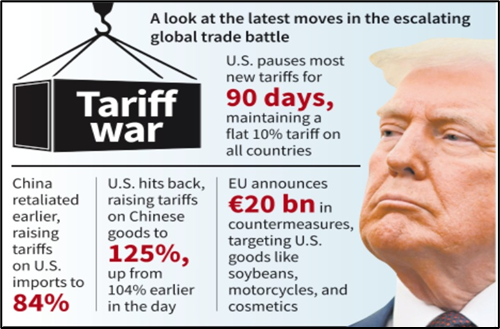Why in news?
President Donald Trump temporarily suspended most tariffs for 90 days amid a global market crisis, while sharply increasing tariffs on Chinese imports to 125%. This move appeared to shift the broader trade conflict into a direct U.S.–China standoff.
The countries included in the tariff pause will now face a reduced 10% tariff, as the U.S. plans individual negotiations with each nation.

What’s in Today’s Article?
- A Brewing US-China Trade War
- US-China Trade Snapshot
- Escalating Tariff War
- Leverage in the Trade War – A Comparison
- Problems with tariffs
A Brewing US-China Trade War
- A full-scale trade conflict is looming as President Trump threatens over 100% tariffs on Chinese goods, effectively creating a trade embargo.
- This move could spark a dangerous decoupling between the world's largest economies.
- The Critical Questions
- Will these measures hurt China more than the US?
- While Trump is open to negotiations with other countries, the long-term impact of this policy gamble is still uncertain.
US-China Trade Snapshot
- Total trade between the US and China stood at $582.4 billion in 2024.
- US exports to China: $143.5 billion (↓2.9% from 2023)
- US imports from China: $438.9 billion (↑2.8% from 2023)
- US experiences a trade deficit of approx. $295 billion, around 1% of US GDP, contrary to Trump’s exaggerated $1 trillion claim.
Escalating Tariff War
- Both countries remain unwilling to back down. China vows to “fight to the end” and has imposed retaliatory tariffs.
- Immediate Consequences of Tariffs
- High costs could make imports from China prohibitively expensive.
- The US may struggle due to dependence on Chinese goods, including:
- Critical drug ingredients
- Rare earth elements (vital for defense tech)
- High-end consumer products
- Washington might be forced to find alternative suppliers or reduce consumption.
- US Strategy: Delay with China, Engage the Region
- The US is prioritizing talks with Japan, South Korea, and others in China’s neighborhood.
- A negotiation with Beijing may come later, if at all.
- Beyond Tariffs: Core Trade Concerns
- The main US grievances extend beyond tariffs:
- Currency manipulation: China keeps the Renminbi undervalued to boost exports.
- Non-tariff barriers: Restrictions on foreign firms in sectors like consumer banking and high-end manufacturing.
Leverage in the Trade War – A Comparison
- The US imports far more from China than vice versa, giving it nominal leverage.
- Meanwhile, China’s economy still depends heavily on exports due to weak domestic consumption.
- China’s Strategic Advantages
- Political Stability - Unlike Trump, Xi Jinping faces no elections or significant internal opposition.
- Economic Planning - China is rolling out a stimulus package combining fiscal and monetary measures.
- Long-Term Strategy - Beijing can continue fiscal stimulus longer and strengthen domestic consumption, which could absorb surplus if exports dip.
- US Weaknesses and Political Pressure
- Consumer Impact - Americans rely on Chinese imports for everyday essentials – clothing, shoes, electronics. Tariff costs are passed on to consumers, especially affecting low-income groups.
- Limited Fiscal Tools - Washington has few options left other than extending Trump-era corporate tax cuts.
- China’s Internal Narrative and Xi’s Image
- The Chinese view the trade war as US bullying, and Xi cannot afford to appear weak.
- Domestic rhetoric and nationalism make it harder for China to back down unless the US makes a move first.
Problems with tariffs
- Tariffs: Difficult to Roll Back
- Tariffs imposed by Trump during his first term remained under Biden and were even increased.
- Once implemented, tariffs tend to become permanent, making them hard to dismantle politically.
- Little Economic Benefit to the US
- A major academic study found that Trump’s tariffs did not significantly impact employment.
- Retaliatory tariffs by China and others hurt American farmers, with job losses in agriculture.
- Global Market Implications
- A prolonged trade war could push China to redirect exports to new markets.
- There’s a high chance that China will dump surplus goods in the EU and India, affecting local industries there.









